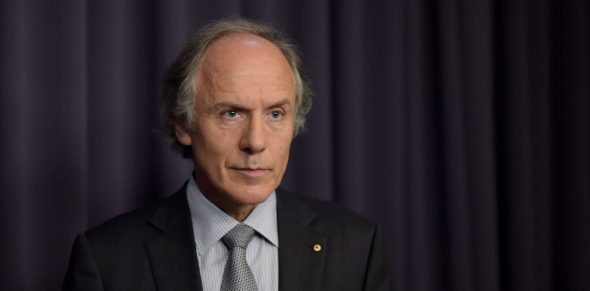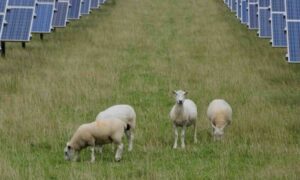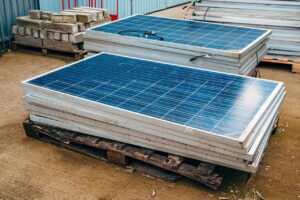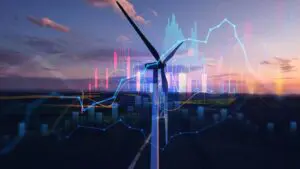Australia’s conservative media commentators have found a new target for their anti-renewables angst, this week launching what was regarded as an almost inevitable attack, on Alan Finkel – Australia’s chief scientist and the man chosen to lead the independent review of the reliability and stability of the National Electricity Market.
In line with similar attacks on other independent, government-appointed advisors – think Ross Garnaut – who have failed to toe the party line on coal, Australia’s right is coming out in force against Finkel, whose role leading the NEM review is guided by the view that Australia can, and will, have a high renewable electricity supply in the not-too-distant future.
Finkel’s crime appears to be not to have wholeheartedly embraced new coal technology, and to write that there are ready solutions to the challenge of high penetration of renewable energy, they just need to be adopted and the market re-fashioned.

Leading the attack against him is former Institute of Public Affairs head of regulatory affairs, Alan Moran, with this article in the right-wing Quadrant journal. Amazingly, it attacks Finkel’s background as an electrical engineer.
“Finkel, an electrical engineer with no background in electricity markets, was commissioned to report on the future security of the electricity market,” writes Moran, one of the fiercest critics of renewable energy.
“His preliminary report is so ill-grounded on facts and so peppered with fanciful assumptions that a government taking the advice would further grind the economy into the ground.
“Nobody can seriously doubt that the malaise confronting electricity is a result of regulatory and tax-forced injections of wind and solar into the market. Not only, as events are proving, is this power source utterly unreliable but it costs three times as much as the coal that its subsidised provision displaces.
“Nobody would buy wind and solar electricity unless they are compelled or bribed to do so. Yet the Finkel preliminary report says the market is being driven not by this but by consumer demand and technology. The credibility of the report is zero except to rusted-on ideologues, and the Prime Minister remains unfortunately among these.”
The attack is heralded by Far Right blogger Andrew Bolt, and then taken up by another right-wing blogger Tim Blair,who complains that Finkel is to visit countries such as Ireland, Denmark and the US to find out how renewable energy is managed there.
“Chief Scientist Finkel’s energy security review should in fact go no further than noting the energy source used for his flights to Europe and the US,” Blair writes.
“When their own lives are at stake, even the greenest of green activists would never contemplate using anything besides proven fossil-fuel technology. Until rapid air travel is safely accomplished using something besides predictable and reliable fossil fuel, why the hell should our entire economy consider switching?
“Do we really want the whole country to follow South Australia’s example by demolishing coal-fired power plants, installing massive wind farms and then sitting around without electricity when the wind doesn’t blow?”
The commentaries comes as the heads of Liberal parties in three states vow to unwind state-based renewable energy targets, and as the controversy over renewable energy reaches new heights.
The role of Malcolm Turnbull – who Blair puts in the “rusted-on ideologue” camp – in driving the South Australian wedge into the energy policy debate is also in the spotlight, after the emergence of reports that the PM’s office was “specifically advised” by the electricity market operator that “the generation mix (ie renewable or fossil fuel) was not to blame” for the storm-driven outage.

Turnbull, who predicted in his National Press Club address that energy would be a defining issue in Parliament this year, on Monday denied that he had ever pointed the finger at South Australia’s wind farms as the culprits of the state’s major blackout event in September last year.
“This is a classic case of misrepresentation by the Labor party and by the left generally,” Turnbull said during Question Time. “Let me be very clear, of course windmills did not cause a blackout, the blackout, as I have said many times, was caused by a storm breaching transmission lines. That is perfectly obvious. That is the only point that was made.”
But this is not how things looked at the time. Analysts at Bloomberg New Energy Finance, for instance, expressed concern that the South Australia incident had sparked a blame game from politicians and media outlets against renewables, even though the failure of two fossil fuelled facilities to restart the system had received little scrutiny.
“The outage has changed the political discourse about energy in Australia,” BNEF said here; adding that, in particular, it had signalled a change in the approach of Turnbull, who they said was making it increasingly unclear whether his government’s new focus on energy security would result in “innovation of policy or better integrate renewables, or measures to retard renewables.”







